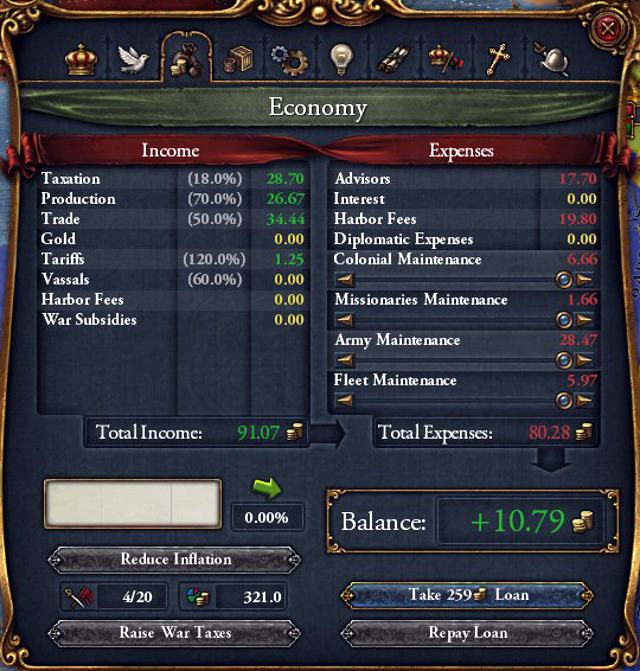Treasury | The Budget
Last update:

In EU IV, unlike in the case of the previous installments, the budget has been simplified to the juxtaposition of monthly income/expenses. Thanks to this, the financial issues are definitely more lucid and comprehensible. The income visible on the left side of the budget window basically boil down to taxes, production, trade and, occasionally, to the other elements like tariffs (if you own colonies), the harbor fees for letting another country use your it, gold mines vassal income and war subsidies received from the other countries as a form of help (possible virtually only in multiplayer). The expenses are restricted mainly to the army upkeep, but also to the maintenance of missionaries, colonies, maintenance of advisors, diplomatic expenses (e.g. when you are a vassal or support the foreign rebels), as well as harbor fees and loan interest. Although, after the introduction of Monarch Power, gold lost some of its value, it is a natural thing that you want to have as much of it as possible. It is mainly spent on building and conscripting new armies so, you should always make sure to keep a positive balance.
If the country's economy is not capable of dealing with the generated expenses, you need to limit them. First of all, you should turn your attention to the army upkeep slide. In the peacetime, you should keep it somewhere in the middle of the scale and, if you are not likely to experience many problems with rebels, you can cut the expenditures by further 10-15% . In general, if nothing shows that, in the nearest future, you will have to use your army, you should disband much of the existing troops. The second slide that determines how much is spent on the fleet, also may be the source of considerable savings. The situation here, though, is more complicated due to the trade. Light ships are used to protect trade routes and, at the same time, the income generated by these. In this case, cutting their budget may do more damage than it will do good. So, if you use many ships for protection of the trade (which you should) you will have to determine manually how much lower these, to make the savings exceed the potential profits from trade with higher financing of the fleet. Compare both of these values and balance things out to lower the expenses but still receive profits due to the protection of the routes. Still, without mucgh hesitation, you can liquidate heavy galleons, especially if you wage war mainly on land. Of course, in the case of a war, increase both of the slides to their maximum and, look for any financial support in war taxes, loans or in a peace treaty.
The remaining two slides probably do not constitute that big a part of the budget, but also here you can fork out some pieces of gold. The money you spend on the missionaries translate directily into their effectiveness while converting. In this case, there exists a possibility of bringing down the expenses, for these, if you choose appropriate ideas, and they still will be converting people for free, in fact. The situation is a bit similar in the case of the colonial slide, although you should restrict limiting this kind of expenses to a minimum. The better you maintain a colony, the faster its population will reach one thousand which is practically synonymous with its self-sufficiency and a general increase in the income generated by it.
So, you can choose between paying larger sums for a shorter period of time, or paying less for a longer period of time (in the long run, it will turn out that you are actually paying more). If you really need to cut down the expenses connected with colonies then, just like with missionaries, there is a probability of receiving a positive growth of population, even with major cut-downs. For this, take advantage of the appropriate ideas (e.g. Land of Opportunity in Exploration). If you want to curb your budget, make sure that population still rises in colonies, even to the smallest extent. Finally, also take into consideration that maintenance costs for each consecutive colony (starting with the third), will be higher and higher. So, it may be a good idea to restrict the number of owned colonies to two only, until you are financially back on your feet again.
During wartime, you also gain access to war tax option. Levying this tax does not give you cash directly and decreases the cost of army and fleet maintenance by 20%, in exchange for the increased war exhaustion ratio, and the extra 10% to the cost of the reduction of the exhaustion. This is especially useful in the case of quick wars that end before the exhaustion factor reaches high levels but, this may also be used to safeguard yourself if the war is getting on the money too fast. Beware, though, because long-lasting war taxes result in steep inflation.
Loans
When you are hard bent on money, you can save the treasury with loans (you take out a loan automatically when you reach 0 with your finances). Loans are taken out for 5 years with annual interest depending on the current modifiers (base interest is 4%). You can also pay up the loa earlier than planned but, even then, you will have to pay up the entire loan just as if you paid it up after the five years. So, with the base interest, one loan is as much as 20% of interest! This is really a lot and additionally, each loan increases inflation by 0.10. In other words you should in general avoid taking out loans and do that only if the situation is really grave, when there is a risk of losing a war if you don't, etc.
The amount of the current loan and the total amount that you can take out depends, mainly, on the size of the country. After you use up the limit for the available loans, reaching 0 with your gold will mean going bankrupt. Bankruptcy will erase all of the loans that you have taken out, but at the price of the fall in stability, inflation will soar, you will suffer the loss of all your Monarch Power points, the loss of prestige and legitimacy. Furthermore, all your advisors and mercenaries will leave and the morale of the remaining armies will drop. All of the loans that you take out thereafter, will be with the interest higher by 10%.
Inflation
Inflation increases the cost of everything that can be bought for money, by its own value. What it means is that a 5% inflation = buildings, army, etc more expensive by 5%. It is easy to guess that it is something that you want to avoid at any cost. Inflation can rise as a result of events, taking out loans (0.10% for each), war taxes and gold mine taxation. Haw high it will soar depends on what percentage of the total income comes from these mines. If it is more than 10%, then the inflation will soar on a monthly basis. This is especially destructive in the case of the New World countries, like the Incas, whose deposits of gold are especially large, where the income from the other sources is low. This will result in inflation rising to a high scale over the years. Once it rises, inflation is difficult to bring down. Apart from events, there are only four other ways to limit it, of which two require the appropriate ideas. You can hire an advisor who will be reducing the inflation by 0.10% annually. Full development of the economic idea will bring inflation down by another 0.10% a year, and will allow you to eliminate 1% directly, at the price of 200 administration points, with the minimum inflation of 3%. The last way is to build the Tax Assessor building, which is going to bring the inflation down by 0.05%. You can only have one such building and, it is additionally available only late into the game, because it requires the 27th administration level.
As much as in the last decades of the game, inflation is not going to mean that much, at the very beginning, it is very difficult to combat and can make the game considerably more difficult. Avoid its excessive rise at all costs. Try not to take out loans and do not build the economy of the country on the Indian gold.
You are not permitted to copy any image, text or info from this page. This site is not associated with and/or endorsed by the Paradox Interactive or Paradox Interactive. All logos and images are copyrighted by their respective owners.
Copyright © 2000 - 2025 Webedia Polska SA for gamepressure.com, unofficial game guides, walkthroughs, secrets, game tips, maps & strategies for top games.
